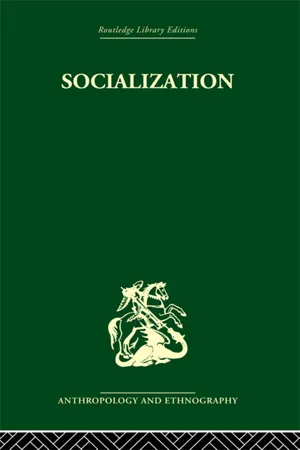Cross Cultural Research
Cross-cultural research in psychology involves studying and comparing different cultures to understand how cultural factors influence human behavior, cognition, and emotions. Researchers aim to identify universal and culture-specific patterns to gain insights into the diversity of human experiences and develop culturally sensitive theories and interventions. This type of research helps to broaden our understanding of human behavior beyond a single cultural perspective.
8 Key excerpts on "Cross Cultural Research"
- eBook - ePub
Cross-Cultural Psychology
Critical Thinking and Contemporary Applications, Sixth Edition
- Eric B. Shiraev, David A. Levy(Authors)
- 2016(Publication Date)
- Routledge(Publisher)
...These kinds of differences (and, of course, similarities) are studied in cross-cultural psychology (Gudykunst & Bond, 1997). Cross-cultural psychology is the critical and comparative study of cultural effects on human psychology. Please notice two important elements of this definition. First, this is a comparative field. Any study in cross-cultural psychology draws its conclusions from at least two samples that represent at least two cultural groups. Second, because cross-cultural psychology inherently involves comparisons, and the act of comparison requires a particular set of critical skills, the study of cross-cultural psychology is inseparable from critical thinking. Cross-cultural psychology examines psychological diversity and the underlying reasons for such diversity. In particular, cross-cultural psychologists study—again, from a comparative perspective—the links between cultural norms and behavior and the ways in which particular human activities are influenced by different, sometimes dissimilar social and cultural forces (Segall et al., 1990). For example, consider the question suggested by the opening vignette to this chapter: Do disaster survivors experience similar symptomatology across cultures (see Bemak & Chung, 2008)? If they do, can a psychologist use an intervention aimed at treating posttraumatic symptoms in the United States in other cultural environments such as Sudan or Iran? Cross-cultural psychology attempts not only to distinguish differences between groups but also to establish psychological universals and phenomena common to all people and groups (Berry et al., 1992; Lonner, 1980). (See Figure 1.1.) For example, cross-cultural psychology attempts to identify commonalties with regard to the structure of human personality: relatively enduring patterns of thinking, feeling, and acting. Such universal traits include neuroticism, extraversion, openness to experience, agreeableness, and conscientiousness (Costa & McCrae, 1997)...
- eBook - ePub
Cross-Cultural Psychology
Critical Thinking and Contemporary Applications, Seventh Edition
- Eric B. Shiraev, David A. Levy(Authors)
- 2020(Publication Date)
- Routledge(Publisher)
...Growing up in cities, towns, and villages – whether it is near a snowy Ann Arbor or in a humid Nairobi – people learn how to understand events around them according to the wishes of their parents, societal requirements, and traditions of their ancestors. The way in which people learn to relate to the world through feelings and ideas affects what these individuals do. Their actions, in turn, have a bearing on their thoughts, needs, and emotions. Conditions in which people live vary from place to place. Human norms of behavior and experiences – formed and developed in various environments – may also fluctuate from group to group. These kinds of differences (and, of course, similarities) are studied by cross-cultural psychology (Gudykunst & Bond, 1997). Cross-cultural psychology is the critical and comparative study of cultural effects on human psychology. Please notice two important elements of this definition. First, this is a comparative field. Any study in cross-cultural psychology draws its conclusions from at least two samples that represent at least two groups of people. Second, because cross-cultural psychology inherently involves comparisons, and the act of comparison requires a particular set of critical skills, the study of cross-cultural psychology is inseparable from critical thinking. Cross-cultural psychology examines psychological diversity and the underlying reasons for such diversity. In particular, cross-cultural psychology studies – again, from a comparative perspective – the links between cultural norms and behavior and the ways in which particular human activities are influenced by different, sometimes dissimilar, social and cultural forces (Lonner, 2019; Segall et al., 1990)...
- eBook - ePub
Cultural Issues in Psychology
An Introduction to a Global Discipline
- Andrew Stevenson(Author)
- 2020(Publication Date)
- Routledge(Publisher)
...35). The aim of this research is to try to find out what aspects of behaviour and experience are common to all human cultures – and thus what aspects are unique to certain places. Cross-cultural psychology is an approach that is favoured by a large proportion of global psychologists, though as we will learn it is not the only approach. It is an essentially culture-comparative approach to relationship between culture and psychology (Berry et al., 2011), and as such can be contrasted with cultural psychology (see Chapter 4). Reflective Exercise 9 What kind of research finding might lead you to conclude that weeping at funerals is a cultural universal ? Key Terms Cross-cultural psychology. A branch of psychology which studies similarities and differences in psychological processes in various cultural groups in order to understand the extent of culture’s influence on those processes. Cross - cultural comparison study. A study which involves ‘participants from two or more cultures and that measure those participants’ responses on a psychological variable of interest’ (Matsumoto & Juang, 2017, p. 35). Culture-comparative, cross-cultural psychology is a dominant, mainstream approach to researching cultural issues in psychology. To gain a firm footing in understanding this approach, it is useful to appreciate three key themes that are foundational to the cross-cultural approach. Psychic unity. A set of psychic structures (mind, memory capacity, perceptual processes) that all humans share. Theme 1: Psychic unity Central to cross-cultural psychology’s search for cultural universals is an assumption of psychic unity (Shweder, 1991, Berry et al., 2011). In everyday terms this dictum states that despite outward appearances, human diversity is only skin deep...
- eBook - ePub
Cultural Psychology
A Once and Future Discipline
- Michael Cole(Author)
- 1998(Publication Date)
- Belknap Press(Publisher)
...Cross-cultural studies, especially when they are sensitive to the local organization of activity, can serve to refute ethnocentric conclusions that “those people” suffer from general cognitive deficits as a consequence of cultural inadequacies. From time to time they may even induce adherents of the first psychology to rethink their conclusions and their experimental methods. I believe this has happened, for example, with respect to the increasing attention being paid to issues of context by scholars working within the first psychology’s paradigm, especially those concerned with cognitive development (Siegal and Cohen, 1991; Wozniak and Fischer, 1993). However, as I have tried to demonstrate in earlier chapters, cross-cultural research within the first psychology is limited in its power to provide a positive explanation for the role of culture in mental life. It has also proven a weak guide to practice. What is needed is an alternative form of psychological inquiry. It is time to elaborate a second psychology, the goal being to be able, eventually, to supersede that ancient set of dichotomies to which both the first and second psychologies belong. Rethinking the Two Psychologies As a first step toward formulating a more adequate approach to the relations between mind and culture, we need to recognize that psychology (like all of the social sciences) is a sharply divided discipline (Koch and Leary, 1985). The 1960s and 1970s, the high-water mark of experimental cross-cultural psychology, were also the decades in which the “cognitive revolution” swept the discipline. It once again became possible and fashionable to include theoretical mental entities or processes occurring between stimulus and response as a focal concern of psychology. The dominant metaphor of cognitive psychology was that of the person as an information-processing system thought of in terms of modern computers...
- eBook - ePub
Culture and Cognition
Readings in Cross-Cultural Psychology
- J. W. Berry, P. R. Dasen(Authors)
- 2019(Publication Date)
- Routledge(Publisher)
...Despite this importance, it is safe to say that no culturally-relative or comparative methodology has received general acceptance by psychologists or anthropologists working in this field. What follows is an attempt to display the problems inherent in comparative cognitive research, and to draw together some of the more consensual views regarding their solutions. Perhaps the most basic question is one of aims or goals: why should psychologists be interested in studying cognitive functioning in a variety of cultural settings? The answer lies in the rejection of one, often ascribed, goal, and in the espousal of two other, rather more legitimate, ones. Comparative cognitive psychological research is not aimed at discovering which peoples are clever, smart or intelligent, and which are not; we are often charged with this aim by critics of testing and by supporters of minority group rights. However, there is not a single study published in the conventional academic literature (to our knowledge) which betrays this as a goal. There are, undoubtedly, ethnocentric and race-related uses made of data and results; however the material and authors collected in this volume avoid these ethnocentric assertions, while maintaining a right to ask questions concerning group differences. The two goals which are claimed may be phrased in terms of two contrasting foci: Comparative cognitive psychology attempts to understand the range, the variability, the differences in cognitive processes as a function of cultural (including ecological and social) variables; Comparative cognitive psychology also attempts to understand the uniformities, the pan-human or cross-cultural consistency in cognitive processes, so that valid generalizations may be made about human cognitive functioning. Thus, we look intensively within cultural systems for the roots of cognitive variation and across cultural systems for those characteristics of cognitive functioning which are universal for all mankind...
- eBook - ePub
- Janet M. Gibson(Author)
- 2019(Publication Date)
- Routledge(Publisher)
...5 Cross-cultural psychology Learning objectives Appreciate the value in comparing behavior across cultures. Appreciate how cultural differences may provide insights into the psychology of humor. Identify several cultural universals and several cultural differences concerning humor. Appreciate challenges in studying humor across cultures. Assumptions of the field Comparisons across cultures enhance our explanations and predictions of behavior. Biases in language, cultural practices, and expectations of both participants and experimenters influence the collection and interpretation of cross-cultural data. Cross-cultural perspective and principles Culture encompasses attitudes, behaviors, and symbols of a group of people. It includes beliefs, languages, and practices that identify the group. The cross-cultural psychology perspective is not a study of culture per se but rather a study of comparisons between cultures. It draws on theories based on evolutionary psychology (e.g., comparing practices developed within cultures to increase procreation chances), socio-ecological factors (e.g., adapting to land, space, politics, and economics), and responses to mixing of cultures over time (e.g., increasing individualism or changes of power) (Shiraev & Levy, 2016). Theory drives the majority of cross-cultural comparisons. Interestingly, for the most part it is a western culture that generates humor theories (Flaskerud, 2017). Specific cultures may be compared because they have differing cultural attitudes, such as humor usage in public, and we want to know how the particular attitude affects humor appreciation or production. Through these comparisons, researchers shape their humor theories to account for similar and different influences of cultural factors on the experience of humor. Core concepts Cultural comparisons of humor reveal similarities and differences in what people find funny or how they express humor...
- eBook - ePub
- Paul B. Pedersen, Walter J. Lonner, Juris G. Draguns, Joseph E. Trimble, Maria R. Scharrón-del Río(Authors)
- 2015(Publication Date)
- SAGE Publications, Inc(Publisher)
...B., & Best, D. L. (Eds.). (2009). Cross-cultural psychology (Vols. 1–4). Thousand Oaks, CA : Sage. Smith, P. B., & Schwartz, S. H. (1997). Values. In J. W. Berry, M. H. Segall, & Ç. Kağitçibaşi (Eds.), Handbook of cross-cultural psychology: Vol. 3. Social behavior and applications. Thousand Oaks, CA : Sage. Spengler, P. M., Strohmer, D. C., Dixon, D. N., & Shivy, V. A. (1995). A scientist-practitioner model of psychological assessment: Implications for training, practice, and research. The Counseling Psychologist, 23, 506 – 534. Sternberg, R. J., & Grigorenko, E. L. (2004). Culture and competence: Contexts of life success. Washington, DC : American Psychological Association. Stewart, E. C., & Bennett, M. J. (1991). American cultural patterns. Yarmouth, ME : Intercultural Press. Sue, D. W., Arredondo, P., & McDavis, R. J. (1992). Multicultural counseling competencies and standards: A call to the profession. Journal of Counseling & Development, 70, 477 – 486. Suzuki, L. A., Naqvi, S., & Hill, J. S. (2014). Assessing intelligence in a cultural context. In F. T. L. Leong (Ed.), APA handbook of multicultural psychology: Vol. 1. Theory and research. Washington, DC : American Psychological Association. Triandis, H. C. (1996). The psychological measurement of cultural syndromes. American Psychologist, 51, 407 – 413. Uzzell, B. P., Pontón, M., & Ardila, A. (2007). International handbook of cross-cultural neuropsychology. Mahwah, NJ : Lawrence Erlbaum. Valsiner, J. (Ed.). (2012). The Oxford handbook of culture and psychology. Oxford : Oxford University Press. Vandello, J. A., & Cohen, D. (1999). Patterns of individualism and collectivism across the United States. Journal of Personality and Social Psychology, 77, 279 – 292. van de Vijver, F. J. R. (2001). The evolution of cross-cultural research methods. In D. Matsumoto (Ed.), The handbook of culture and psychology. New York : Oxford University Press. van de Vijver, F. J...
- eBook - ePub
Socialization
The approach from social anthropology
- Philip Mayer(Author)
- 2013(Publication Date)
- Routledge(Publisher)
...The question is whether, having been out of touch for a while (as indicated by the quotation), anthropologists are in a position to assess in what ways psychologists may be of assistance to them and vice versa, since there have been extensive changes. The most important of these changes, in the present context, has been a movement away from Kardiner-type studies of culture and personality. The reason, briefly and too dogmatically, is that this approach starts by taking for granted (rather than demonstrating) the universal validity of the bulk of psychoanalytic theory. Field material is collected in accordance with the major variables postulated by the theory. The findings are then interpreted in terms of greatly oversimplified causal linkages, ending up invariably and not surprisingly with conclusions in harmony with the theory. This is because the theoretical framework has to be very loose, so as to accommodate highly complex data; at the same time, the looseness practically guarantees some kind of fit between theory and data, and one gets out what one has put in. All this is, of course, a caricature, though I believe it to be so in the sense of ‘exaggeration of characteristic traits’. RECENT PSYCHOLOGICAL WORK OF CROSS-CULTURAL INTEREST The first line of retreat from Kardiner has been a partial rejection of the view that the functioning of a society depends on the sharing by its members of a substantial core of basic motives. It has always been difficult to reconcile this view with the striking diversity of individuals within the same culture, which even emerges from a careful reading of the case studies supplied by culture-personality theorists themselves. The middle-of-the-road opinion is that the need for common motives has been greatly overstressed. A far more radical departure is the thinking of an American anthropologist with a strong psychological and biological bias, Anthony Wallace (1961)...







